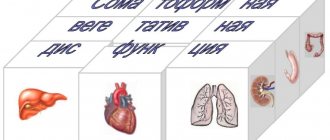Violation of the normal perception of the surrounding world and oneself is a pathological condition, which in medicine is classified as depersonalization. Depersonalization is expressed by a painful feeling of change, lack of unity or loss of the most important personality qualities that are acquired in the process of life experience (character, worldview, value system, life attitudes, etc.). Patients with depersonalization feel that their “I” has completely changed, the old “I” has disappeared, they have lost their spiritual world, they have lost their individuality and independence. As a rule, all patients with depersonalization are prone to “soul-searching” and persistent attempts to figure out “what’s wrong with them.”
In simple terms, depersonalization is a state in which a person feels “changed”, “not the same as before”, “lost some important personality properties”. In extreme, most pronounced cases, he “sees” and evaluates himself from the outside. Often the pathological condition under consideration is referred to as depersonalization-derealization, which implies not only a split personality, but also a violation of the perception of the surrounding world - the patient seems to be inside a virtual game, all the objects and living creatures around him have a flat shape or an unreal color.
At CELT you can get advice from a psychiatrist.
- Appointment with a psychiatrist with an extended interview, psychotherapy session - 4,500
Make an appointment
Causes of depersonalization
Depersonalization-derealization syndrome is a mental disorder that occurs within the framework of:
- neurotic disorders;
- neurological disorders;
- suffered shock (for example, after a serious injury);
- frequent stress;
- schizophrenia;
- manic syndrome;
- depressive syndrome.
The condition in question can be short-term or long-term, and in the latter case, such a mental disorder often leads to suicide. If the depersonalization-derealization syndrome is short-term, then most likely it is triggered by some kind of nervous shock (death of a loved one, trauma, and so on). The short-term course of the condition in question always ends in complete recovery without any consequences, although this may take several months.
Causes of pathology
Derealization is a neurotic disorder that affects people without any special mental pathologies who experience excessive mental and physical stress, are in a stressful situation and lack sleep. In addition, derealization can be a symptom of any disease, both somatic and mental.
The main reasons for the occurrence of such a pathological condition include:
- biochemical factors. A decrease in the number of neurotransmitters responsible for the normal functioning of the psycho-emotional sphere, as well as deterioration in the functions of the neural opiate system and a lack of gamma-aminobutyric acid;
- hereditary factors. It has been proven that the tendency to increased anxiety may have genetic background. In addition, within one family, as a rule, there is a single way of responding to stressful situations, also determined genetically;
- personal and psychological factors. This category of reasons includes excessive suspiciousness and impressionability of a person, heightened pedantry and perfectionism, increased demands on oneself and fixation on negative emotions;
- somatic factors. Some organic diseases can lead to the development of similar phenomena. Such pathologies include diseases of the respiratory and cardiac systems, thyroid dysfunction and low blood sugar levels;
- social factors. Psychological trauma received in childhood, an unfavorable environment at home or in a team, as well as various stressful situations can lead to a person feeling symptoms of derealization and depersonalization.
Derealization can be triggered by poor nutrition, non-compliance with rest and sleep schedules, and addictions.
Derealization, as well as depersonalization, are not dangerous pathologies. They will only slightly worsen the quality of life. This is how the human psyche wants to protect itself from potentially stressful situations and traumatic experiences. That is, it is a kind of defense mechanism. But you can and should get rid of this condition, but this requires the help of specialists.
Symptoms of depersonalization-derealization syndrome
The clinical picture of depersonalization in some cases is quite vivid - complaints sound characteristic and typical for this disorder, and in some cases it is difficult for the patient to determine and express “what is wrong with him,” and the essence of all his complaints will come down to the painful repetition of the phrase “with me.” something is happening, I don’t feel good, something bad happened to me, I don’t understand.” In a conversation with such patients, it is important to correctly formulate questions and be able to identify that element of mental activity, the perception of which is impaired in the patient.
Doctors consider several symptoms of the syndrome:
- A feeling of altered mental processes is a feeling that the information entering the brain, as it were, “encounters a kind of internal barrier and cannot be assimilated in full,” in other words, there is a feeling of impaired perception of information. Trying to express this, patients say that they are “as if covered with a cap,” “placed in a glass flask,” “separated from the environment by an invisible wall.” This may be a feeling of disruption of one or more mental functions (emotions, thinking or activity) - or even all mental activity, which is accompanied by a feeling of “incompleteness of consciousness” and a subjective disturbance in the perception of one’s memories, ideas that lose brightness, seem pale, indistinct, “unreal”. With pronounced depersonalization, there is a feeling of strong alteration or loss of several mental functions or all mental activity, up to a complete loss of the sense of one’s own existence.
- A feeling of altered perception of bodily sensations - obtained through various senses (vision, hearing, various types of skin and other sensitivity), which are expressed, for example, by a feeling of physical emptiness, numbness, mortification in various parts of the body, in more severe cases there is a feeling of complete absence various organs, body parts, body weight, etc. In especially severe cases, a feeling of complete absence of the body may develop, but at the same time, in contrast to depersonalization of mental functions, the feeling of the mental “I” is always preserved.
- A feeling of changes in the perception of the surrounding space - color, volume, contrast: patients complain that the sounds of the outside world are heard muffled, distant or, on the contrary, deafeningly loud, everything seems too bright or, on the contrary, faded, as if it were a set for a film, as if painted, unreal, fake.
People around you may notice disturbances in a person with depersonalization-derealization syndrome of a mental nature:
- he sits in one place and in one position for a long time, as if he has nothing to do and does not need to go anywhere;
- the patient cannot remember what he likes and what he doesn’t (for example, does he like apples);
- lack of desire to lead an active lifestyle - the patient does not wash things, does not clean the house, does not attend work/school.
Symptoms
To recognize a disorder, you need to know its symptoms. During derealization, a person is in the following state:
- The feeling that there is a “veil” or “haze” in the head. Visual images are perceived as if in a fog.
- Perception of signals from the surrounding reality with some delay.
- Everything that happens at a given moment is perceived as a movie or a dream, and the person himself feels like an outside observer. Patients often talk about a feeling of unreality of what is happening.
- Inability to obtain a positive emotional response from things and activities that previously brought pleasure.
- Visual and auditory perception is dulled. The colors become faded and the sounds become muffled. Tactile perception may also be impaired and taste buds may be temporarily disabled. Food and drinks seem tasteless.
- The sense of time is distorted. A person may say that all processes have frozen or are moving too quickly.
In severe forms of the disorder, short-term memory loss may occur. After an attack, a person is unable to remember who he talked to today, what he ate, etc.
The most important symptom of derealization and depersonalization is the person's extreme anxiety about the condition. Based on this sign, the psychotherapist can assume the presence of a disorder in the patient.
Classification of the syndrome
In medicine, it is customary to distinguish several forms of depersonalization-derealization syndrome:
- Autopsychic. The patient becomes immersed in himself, he experiences fear and confusion, because he feels that he has changed, is not the same as before, his feelings and thoughts have changed, they are “spoiled”, “unreal”. This type of disease in question is often characterized by the following behavior: reluctance to communicate with friends and family, an external absence of emotional manifestations, complaints of memory loss (incomplete).
- Allopsychic. It is this type of depersonalization syndrome that doctors call derealization - the patient perceives the surrounding reality as a dream or a game/fairy tale. Characteristic signs of such a disorder will be a lack of understanding of one’s location in familiar places, indifference/complete ignorance when meeting a familiar person, problems recognizing people (sometimes they all seem the same to the patient), and the inability to clearly determine the color and shape of objects.
- Somatopsychic. This form is considered the most unusual because patients present strange complaints - for example, they may feel like they are not wearing clothes, or that each part of their body exists separately, and so on. We can say that the somatopsychic type of depersonalization-derealization syndrome is characterized by a pathological perception of one’s own body.
How to start treatment
What can you do if you experience derealization-depersonalization syndrome?
Start by making a list:
- Write down all the symptoms and sensations that you experience, including those that may seem unrelated to the cause of your health.
- List all situations, serious stress, stress or recent changes in life.
- All medications, vitamins and other supplements you take and in what doses.
- With this list, visit a psychotherapist. Bring a family member with you to your initial consultation, if possible. Someone who can remember what you missed or forgot.
Ask your doctor
- What is most likely causing my symptoms?
- Are there other possible reasons?
- Do I need any tests or tests to confirm the diagnosis?
- What therapeutic procedures should be applied? What do you recommend?
- Are there alternatives to the basic approach you propose?
- Do I need to see a related specialist?
What to expect when visiting a doctor
Your doctor will ask you a series of questions. Be prepared to answer them truthfully and completely, and reserve time for this, as it may take longer than you planned.
Your doctor may ask:
- When do you first start experiencing symptoms?
- Have your symptoms been continuous or intermittent in attacks?
- How much do these symptoms reduce your quality of life?
- Do you experience a decrease in your symptoms or do they only get worse over time?
- Under what conditions may symptoms worsen?
- Do you have any chronic diseases?
- Do you have a mental health disorder such as anxiety, depression, or post-traumatic stress disorder (PTSD)?
- What medications or herbal supplements are you taking?
- Do you drink alcohol or have you ever used drugs?
To make a complete and accurate diagnosis of the presence of derealization-depersonalization syndrome, it may be necessary to conduct a full pathopsychological examination and a thorough examination by a psychiatrist or psychotherapist.
Diagnosis with derealization depersonalization syndrome
- You must experience persistent or intermittent experiences of depersonalization, derealization, or both.
- During depersonalization or derealization, you realize that these sensations are not real.
- Your symptoms cause significant distress or interfere with your social life, work, or other important areas of your life.
- Your symptoms are not caused by a mental illness such as schizophrenia or panic disorder.
- Your symptoms are not due to the direct physiological effects of alcohol, drugs or psychoactive substances.
- You need further evaluation or testing to rule out other physical or mental health conditions, such as the effects of substance abuse.
Diagnostic measures
This syndrome is diagnosed based on the patient’s complaints and information from relatives, which describe human behavior characteristic of this disease. No examinations, collection of tests or instrumental examinations make it possible to identify mental abnormalities of the nature in question; on the contrary, people with progressive depersonalization-derealization syndrome look absolutely healthy.
The diagnosis of depersonalization is made clinically - through conversation or semi-structured interview. All additional examination methods are prescribed only in cases where it is necessary to exclude concomitant pathologies.
Diagnosis of derealization
To make an accurate diagnosis, the doctor needs to study the medical history in detail, collect an anamnesis, and also conduct research on the clinical manifestations of the symptom. The following scientific research methods are used to diagnose derealization syndrome:
- studying the medical history, interviewing the patient;
- medical examination;
- patient monitoring;
- psychodiagnostics using clinical scales;
- psychological research;
- EEG, x-ray;
- pharmacological tests.
To determine the disease, first of all, the doctor or psychotherapist interviews the patient, clarifies the symptoms, their duration and specificity. The interview method is paramount in diagnosis, since many mental disorders or syndromes are difficult to recognize only through observation or testing of the patient. Various psychopathologies have similar signs, so one of the main points is to interview the patient about complaints and symptom complexes.
Diagnosing derealization is a rather difficult task for a specialist, since this phenomenon is similar to mental automatism, illusions and other symptoms. The doctor must find out how often the patient is haunted by distortions of the surrounding reality, whether hallucinations are present in this state, what somato-vegetative changes occur in the body. It is important to study the medical history, namely: whether mental illnesses were present in the family, whether the patient suffers from psychopathy at the moment. Derealization due to overwork or depression is much easier to treat than with schizophrenia. Therefore, the specialist must find out whether derealization syndrome is a single complaint or occurs in combination with other pathological symptoms. The history of studying the course of the disease and the general condition of the patient can be divided into two types:
- subjective;
- objective.
A subjective study of medical history is understood as asking the patient for the presence of a disease in the past. To diagnose derealization, the doctor clarifies the following points:
- whether mental illness was present in the family;
- when derealization first appeared (age, situation);
- family relationships, social status, level of stress resistance, conflict;
- how often the patient uses alcohol and drugs;
- Do you have suicidal tendencies?
- somatic condition, brain injury.
As an objective assessment of the disease, the psychiatrist conducts a survey of relatives, acquaintances, and employees who have close contact with the patient.
A psychiatric examination means checking reflexes, the condition of the skin, the symmetry of body parts and the physiological characteristics of the patient.
The observation method is also very productive for making a diagnosis. The patient is monitored not only by the attending physician, but also by the medical staff, recording behavior, reactions, symptoms and attacks in a special diary. With derealization, a person behaves inhibited, often freezes in place, and tries to isolate himself from others. If auditory perception is impaired, the patient listens to sounds; if there is visual distortion, he tries to peer into space, rubs his eyes, and squints.
The patient is examined using special scales. There are two types of diagnostic scales:
- self-esteem;
- objective.
Self-assessment questionnaires are answered by the subjects themselves, based on a subjective assessment of personality traits and symptoms. Such scales are used to assess the patient's condition before and after therapy. Basically, self-assessment scales are prescribed to people in a premorbid state (asthenia, neurosis, etc.). The psychiatrist may offer to answer a list of questions or statements he has personally compiled for an individual assessment of the patient’s mental state.
Scales of the second type are filled out by the specialist himself, based on the symptoms of the subject. The most famous test for derealization is the objective scale of Yu. L. Nuller and E. L. Genkina, which allows you to determine the degree of perception impairment. This graduated scale is a list of symptoms, each of which is divided into several types of manifestations. The subject needs to mark the manifestation of each symptom with a tick, depending on his feelings during derealization. The list of symptoms in the scale is mainly presented in relation to the surrounding reality and people, in particular cognitive and emotional activities. The technique diagnoses not only derealization, but also depersonalization syndrome. If the subject scored more than 32 points, we can talk about the presence of derealization. The Yu. L. Nuller scale is the best test for derealization and is widely used to diagnose this condition in psychotherapeutic clinics and neuropsychiatric hospitals.
A psychological examination is a determination of the degree of impairment of cognitive processes, emotional sphere and behavior. With derealization, perception and sensations suffer first; images seem blurry and lack clear edges. Memory also undergoes certain changes: the patient complains of déjà vu or a feeling of newness in the surrounding reality. Emotions are expressed reluctantly, there is inertia in behavioral reactions. A clinical psychologist conducts research on intelligence, thinking, levels of depression, accentuations and psychopathy. Using psychodiagnostic techniques, the specialist studies traumatic situations in the patient’s life, relationships within the family, stress resistance and anxiety levels. The results of the study are transferred to a psychiatrist, who makes a diagnosis based on them.
Additional tests may include an EEG, x-ray, blood test, and urine test. When derealization occurs against the background of depression, sleep EEGs are studied; as a rule, the slow-wave sleep phase is significantly reduced in this disorder. Blood and urine tests are prescribed not only to determine concomitant somatic diseases, but also to prevent complications due to pharmacotherapy.
To determine derealization, drug diagnostics with diazepam, proposed by the famous scientist Yu. L. Nuller, is used. The psychiatrist has proven that when a small dose of medication is administered, patients with depersonalization-derealization syndrome experience disappearance of the attack within 20 minutes.
Diagnosing derealization is a very painstaking and difficult process. A wide range of specialists are studying the patient’s condition, using a variety of methods and tests.
General principles of treatment
Depersonalization-derealization syndrome is a mental disorder for which an individual approach is used to treat. If this condition was caused by some kind of nervous shock and is some kind of “protection” of the body after powerful emotional outbursts, then treatment comes down to a course of psychotherapy. After the specialist talks with the patient and assesses his condition, antidepressants and various physiotherapeutic procedures - acupuncture, herbal medicine, soothing massage - can be prescribed. As a rule, with a competent approach to prescriptions, this pathological condition passes without complications, and the patient’s condition is completely restored.
But if the depersonalization-derealization syndrome is protracted and accompanied by suicidal attempts, then such patients need to be treated only in inpatient departments of medical institutions; they are prescribed antipsychotics and tranquilizers in large doses. If such treatment tactics give positive results, and the patient becomes calmer and begins to perceive the world around him in a normal light, then he is prescribed psychotherapy, and all medications are discontinued. Psychotherapists work with such patients for a long time, and even after discharge from a medical institution, they must periodically visit a specialist in order to finally get rid of obsessive, incorrect sensations.
Depersonalization-derealization syndrome is a fairly serious mental disorder that can easily be corrected. If you find these symptoms in yourself or your loved ones, we recommend that you consult a specialist. To clarify the diagnosis and receive qualified medical care, you can contact CELT. This is one of those conditions in the treatment of which our psychoneurologists achieve good results.
Make an appointment through the application or by calling +7 +7 We work every day:
- Monday—Friday: 8.00—20.00
- Saturday: 8.00–18.00
- Sunday is a day off
The nearest metro and MCC stations to the clinic:
- Highway of Enthusiasts or Perovo
- Partisan
- Enthusiast Highway
Driving directions
Derealization depersonalization - risk factors
Although anyone can become ill and experience derealization-depersonalization syndrome, the following situations are at increased risk:
- In the presence of characterological traits, when there are difficulties with adaptation in difficult situations.
- During adolescence, this disorder is rare in children and the elderly.
- Use of psychoactive substances (alcohol, drugs, spice and other psychoactive substances).
Causes of depersonalization and derealization:
- Having mental disorders such as depression or anxiety.
- Use of substances such as hallucinogens or marijuana.
- The presence of a neurological disease associated with seizures or existing head injuries.
Derealization and depersonalization complications
Episodes of depersonalization or derealization are often difficult for patients to endure, but they do not pose any danger to life. They can cause:
- Difficulty solving various problems and memory problems.
- Difficulties in work and daily activities.
- Problems in relationships with family and friends.
Having first felt depersonalization syndrome or derealization syndrome, a person, as a rule, turns to a therapist or neurologist, but after examining the patient, the doctor refers to a doctor who specializes in the diagnosis and treatment of mental disorders, the activity of the higher nervous system, a psychiatrist or a psychotherapist.
Here's some information to help you prepare for your appointment and know what to expect from your doctor.








